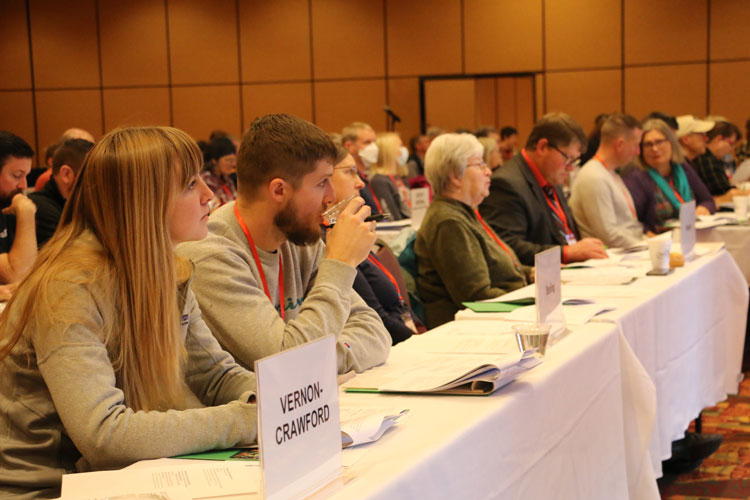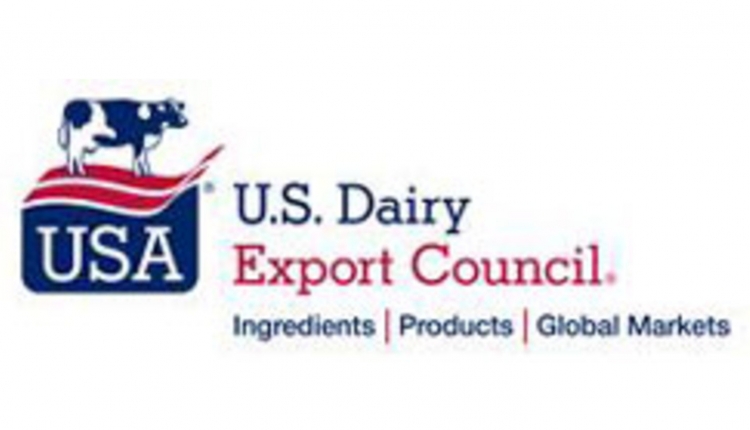The information below has been supplied by dairy marketers and other industry organizations. It has not been edited, verified or endorsed by Hoard’s Dairyman.

At the 92nd annual Wisconsin Farmers Union State Convention Dec. 9-11th in Wisconsin Dells, delegates adopted policy that will guide the family farm organization’s work at the Capitol, in Congress, and across the countryside. Wisconsin delegates will have the opportunity to bring the stances to the National Farmers Union Convention in San Francisco March 5-7, 2023.
"The policy discussion at the annual State Convention is the democratic process in its purest form,” said WFU President Darin Von Ruden. "Farmers from a variety of backgrounds come together to respectfully discuss and come to a consensus on the issues impacting their farms and rural Wisconsin."
The following are among the Special Orders of Business that reflect WFU's 2023 policy priorities:
PRESERVING SMALL & MID-SIZED FARMS: WFU, with various allied organizations, will intensely explore the problem of ongoing farm loss, develop and lead systemic and realistic solutions to sustain small- and mid-size farms to continue their operation. The systemic approach will address the interrelationship between issues related to government assistance and regulation, demographics, business, economics, legacy and succession, market concentration, trade structures, development of marketing, politics and farm input, competitiveness, amongst others.
CONCENTRATION IN THE AGRICULTURE INDUSTRY: WFU strongly demands that the Wisconsin Department of Justice (WI DOJ) and the United States Department of Justice (US DOJ), as well as other regulatory agencies, aggressively investigate concentration in agriculture and initiate action to level the playing field for family farmers and return meaningful competition to the marketplace. WFU also urges the Wisconsin Attorney General’s office to vigorously enforce the law limiting ownership by foreign entities to 640 acres of land in Wisconsin.
FAMILY FARMERS SHAPING CLIMATE CHANGE POLICY: WFU urges the State Legislature and Congress to expand existing programs or develop new legislation to address climate change by appointing a Climate Change Rural Task Force to inform and articulate an agricultural and rural plan in the emerging climate legislative platform. We also call for expanding and supporting appropriations for existing USDA programs and for development of a labeling system that informs consumers of food and other consumer goods that are carbon intensive in their production and manufacturing process. WFU calls for the enactment of legislation that would facilitate family farmer participation in carbon credit markets, such as the Growing Climate Solutions Act and the Energy Innovation and Carbon Dividend Act. WFU supports shifting fossil fuel subsidies towards regenerative and conservation farming practices; local initiatives to build resilience in food, fiber, and energy systems; investment in energy efficiency; efforts to revitalize communities with agricultural businesses that utilize new technologies and market creation for diversified and specialty crops; education programs to help farmers share and improve strategies, as well as for consumers on the role farmers and food systems play in climate mitigation and to help them choose food produced using climate friendly practices.
FAMILY FARMERS SHAPING WATER QUALITY POLICY: WFU strongly supports the enactment of recommendations prepared by the 2019 Speaker's Task Force on Water Quality during the 2023 Wisconsin legislative session. These include, identifying best practices for testing and data collection, measuring water quality in different parts of the state, and types of soil, determining the sources and causes of contaminants impacting water quality, consulting with stakeholders to assess current practices to manage runoff as well as suggestions to improve these efforts, investigating remedies that will protect a healthy and stable supply of water for residents and industry, septic systems to safeguard a healthy water supply, and studying best practices for designing and constructing wells. WFU supports legislation that requires the Legislature to find a permanent funding source for the goals the Task Force has set forth. We also support legislation for remediating drinking water contaminated with PFAs and restrictions to prevent future PFAs contamination.
Other highlights from the grassroots policy process included support for:
- Increasing the capacity of and starting new state and USDA-inspected meat processors throughout the state, with increased support from County and Regional Economic Development agencies, streamlined regulation, and industry workforce development.
- Establishment of a mandatory program for managed growth based on market demand and price stability in the 2023 Farm Bill.
- Full funding of the Environmental Quality Incentives Program for practices including but not limited to planting cover crops, nutrient management planning, stream bank fencing, barnyard runoff control, regenerative agricultural practices, prairie STRIPS, beetle banks, perennial buffers adjacent to waterways, native plantings, and no-till planting methods.
- A state law that milk pickup cannot be restricted by county, town, city, or village ordinance.
- Simplification of the process to license on-farm milk processing, rather than a one-size-fits-all approach, and for clarification by DATCP of rules and allowances for on-farm processors.
- An increase in the allowable THC content of hemp, as tested in the farmer’s field, from 0.3% to 1.0%. WFU also calls upon the FDA to create a safe and regulated pathway for CBD to be utilized in food and beverage for human consumption, and pet and livestock products.
- Protecting our native pollinator population, with encouragement for the use of Xerces guidelines to ensure the health of pollinators and add native plant diversity in agricultural landscapes.
- Targeting crop insurance programs to support beginning farmers and reduce crop insurance premium costs for farmers implementing soil health and conservation practices.
- Incentivizing climate-resilient practices through crop insurance programs.
- The addition of 4 commissioners to the Public Service Commission (PSC). Their decisions, with an outsized impact on rural communities, are far too important to be left to 3 political appointees.
- Preference for distributed solar generation and avoidance of installations that take productive farmland out of production.
- Finalization of the Farmer Fair Practice Rules within GIPSA, which would bolster fundamental protections for family farms.
- Increased funding and support for farmers’ markets, including programs that enable customers to purchase produce from local farmers.
- Protection of critical investments in the Supplemental Nutrition Assistance Program (SNAP) and the Emergency Food Assistance Program (TEFAP) at a time of rising food prices and insecurity.
- Providing nutritious meals, sourced from local farms, to all Wisconsin students.
- Adequate funding and the use of online training and in-person testing for the Youth Tractor and Machinery Safety Certification Program to address the shortage of funding and teachers.
- Programs that encourage and incentivize transitions to young/beginning/BIPOC farmers.
- A Beginning Farmer Tax Credit (BFTC) providing the seller a tax credit for the sale of livestock, land, or machinery to beginning farmers.
- Expansion of the Homestead Tax law to target property tax relief to more people.
- Comprehensive revision of Wisconsin’s eminent domain statutes.
- Efforts within the 2023 Farm Bill to protect family farmers and incentivize more crop diversity.
Members will carry their policy priorities forward at WFU’s Farm & Rural Lobby Day January 18th in Madison. RSVP at www.wisconsinfarmersunion.com/events.


